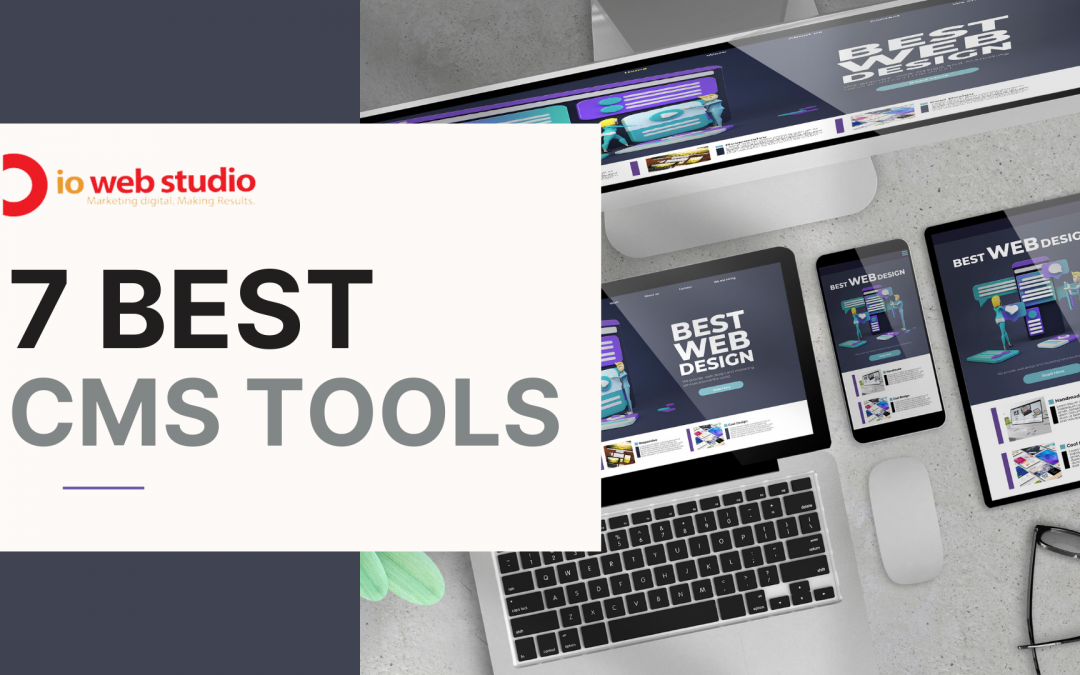Content Management Systems (CMS) have revolutionized the way we create and manage websites. With their user-friendly interfaces and powerful features, CMS platforms have become the go-to choice for businesses and individuals looking to establish an online presence. To enhance the efficiency and effectiveness of CMS development, developers can rely on a range of specialized tools designed specifically for CMS development. In this blog, we will explore seven of the best CMS development tools available in the market today.
1. WordPress

WordPress is undoubtedly one of the most popular CMS platforms worldwide. It offers a comprehensive ecosystem of plugins, themes, and templates that simplify website development.
Developers can leverage its extensive documentation, community support, and vast plugin repository to customize and extend WordPress to meet their specific requirements.
2. Joomla

Joomla is another widely used CMS platform, renowned for its flexibility and scalability. It provides a robust framework that allows developers to create powerful websites and applications. Joomla’s extensive range of extensions, templates, and modules enables developers to build feature-rich websites quickly.
Moreover, Joomla’s extension directory provides a vast array of plugins and modules, enabling developers to extend the core functionality of their websites. These extensions cover various aspects, including e-commerce, social networking, forms, SEO, and more. Joomla’s flexible permission system ensures that content management can be delegated to different users with varying levels of access, making it suitable for large-scale websites and collaborative environments.
3. Drupal

Drupal is a highly flexible and customizable CMS platform that empowers developers to create complex websites with advanced content management capabilities. It offers a robust architecture that supports scalability and high-performance requirements. Drupal’s modular approach allows developers to leverage its vast ecosystem of modules and themes, enabling them to build unique and tailored websites.
With Drupal, developers have fine-grained control over content creation, organization, and publishing workflows. Its advanced user and permission management system ensures that multiple contributors can collaborate efficiently. Drupal’s active community and extensive documentation provide developers with the resources and support needed to tackle any project complexity.
4. Magento

Magento is primarily known as an e-commerce platform, but it also serves as a content management system. It is a comprehensive solution for building and managing online stores of any size or complexity. Magento offers a rich set of features, including product management, order processing, inventory management, payment gateway integration, and marketing tools.
Developers can leverage Magento’s modular architecture to customize and extend its functionality based on specific business requirements. Its robust API enables seamless integration with third-party systems and services. With a vast selection of themes and extensions available, developers can create visually stunning and feature-rich e-commerce websites.
5. Shopify

Shopify is a cloud-based CMS platform specifically designed for e-commerce. It provides an intuitive interface and a range of built-in features to simplify the process of setting up and managing online stores. Shopify offers an extensive collection of customizable templates, allowing developers to create visually appealing and responsive websites without the need for extensive coding.
Developers can further enhance Shopify’s functionality by utilizing its App Store, which offers a wide selection of plugins and extensions. These extensions enable developers to add features such as social media integration, product reviews, email marketing, and more. Shopify’s robust infrastructure ensures secure and reliable hosting, automatic software updates, and built-in scalability, making it an excellent choice for businesses of all sizes.
6. TYPO3

TYPO3 is an enterprise-grade CMS known for its scalability and ability to manage large and complex websites. It provides a comprehensive set of features, including content management, multi-language support, versioning, workflows, and advanced user management. TYPO3’s flexible architecture allows developers to create customized solutions tailored to their clients’ needs.
The TYPO3 extension ecosystem offers a wide range of extensions that enhance functionality and extend the CMS’s capabilities. Developers can leverage TYPO3’s templating engine and Fluid, its own powerful templating language, to create dynamic and responsive websites. TYPO3’s focus on enterprise-level security and stability makes it a popular choice among large organizations and institutions.
7. Contentful

Contentful takes a headless CMS approach, decoupling the content management layer from the presentation layer. It provides a flexible and scalable platform that allows developers to deliver content seamlessly across multiple channels and devices. Contentful’s API-first approach enables developers to build websites or applications using any programming language or framework.
By separating content creation and management from the frontend, developers have the freedom to create highly customized and tailored experiences. Contentful’s powerful APIs allow for easy integration with third-party services and tools. With its cloud-based infrastructure and robust content modeling capabilities, Contentful is a preferred choice for developers looking for a modern and flexible CMS solution.
Conclusion
In summary, the CMS development tools mentioned offer a range of features to meet diverse website development needs. Whether you prefer Joomla, TYPO3, or others, it’s important to choose the right tool based on your project requirements.
Additionally, if you need professional CMS development services, IO Web Studio is a trusted agency with expertise in various CMS platforms. Enhance your website’s functionality and user experience by partnering with IO Web Studio.
